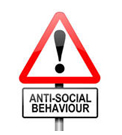
Mental illnesses can affect anyone. We all likely know someone who has experienced a mental illness at some point. Yet there are still many hurtful attitudes around mental illnesses that fuel stigma and discrimination and make it harder to reach out for help. It’s time to look at the facts. Here are ten common myths about mental illnesses.
 Myth #1: Mental illnesses aren’t real illnesses.
Myth #1: Mental illnesses aren’t real illnesses.
Fact: Mental illnesses are not the regular ups and downs of life. Mental illnesses create distress, don’t go away on their own, and are real health problems with effective treatments. People who experience mental illnesses should be treated with the same concern and respect shown to a cancer patient or a person with pneumonia.
 Myth #2: Mental illnesses will never affect me.
Myth #2: Mental illnesses will never affect me.
Fact: All of us will be affected by mental illnesses. You may not experience a mental illness yourself, but it’s very likely that a family member, friend, or co-worker will experience challenges.
 Myth #3: Mental illnesses are just an excuse for poor behavior.
Myth #3: Mental illnesses are just an excuse for poor behavior.
Fact: It’s true that some people who experience mental illnesses may act in ways that are unexpected or seem strange to others. We need to remember that the illness, not the person, is behind these behaviors. No one chooses to experience a mental illness. People who experience a change in their behavior due to a mental illness may feel extremely embarrassed or ashamed around others.
 Myth #4: Bad parenting causes mental illnesses.
Myth #4: Bad parenting causes mental illnesses.
Fact: No one factor can cause mental illnesses. Mental illnesses are complicated conditions that arise from a combination of genetics, biology, environment, and life experiences. Family members and loved ones do have a big role in support and recovery.
 Myth #5: People with mental illnesses are violent and dangerous.
Myth #5: People with mental illnesses are violent and dangerous.
Fact: People who experience a mental illness are no more violent than people without a mental illness. It’s also important to note that people who experience mental illnesses are much more likely to be victims of violence than to be violent.
 Myth #6: People don’t recover from mental illnesses and should be kept in hospital for life.
Myth #6: People don’t recover from mental illnesses and should be kept in hospital for life.
Fact: People can and do recover from mental illnesses. Today, there are many different kinds of treatments, services, and supports that can help. No one should expect to feel unwell forever. The fact is, people who experience mental illnesses can and do lead productive, engaged lives. They work, volunteer, or contribute their unique skills and abilities to their communities. Even when people experience mental illnesses that last for a long time, they can learn how to manage their symptoms so they can get back to their goals. If someone continues to experience many challenges, it may be a sign that different approaches or supports are needed.
 Myth #7: People who experience mental illnesses are weak and can’t handle stress.
Myth #7: People who experience mental illnesses are weak and can’t handle stress.
Fact: Stress impacts well-being, but this is true for everyone. People who experience mental illnesses may actually be better at managing stress than people who haven’t experienced mental illnesses. Many people who experience mental illnesses learn skills like stress management and problem-solving so they can take care of stress before it affects their well-being.
 Myth #8: People who experience mental illnesses can’t work.
Myth #8: People who experience mental illnesses can’t work.
Fact: Whether you realize it or not, workplaces are filled with people who have experienced mental illnesses. Mental illnesses don’t mean that someone is no longer capable of working. Most people who experience serious mental illnesses want to work but face systemic barriers to finding and keeping meaningful employment.
 Myth #9: Kids can’t have a mental illness like depression. Those are adult problems.
Myth #9: Kids can’t have a mental illness like depression. Those are adult problems.
Fact: Even children can experience mental illnesses. In fact, many mental illnesses first appear when a person is young. Mental illnesses may look different in children than in adults, but they are a real concern. Mental illnesses can impact the way young people learn and build skills, which can lead to challenges in the future. Unfortunately, many children don’t receive the help they need.
 Myth #10: Everyone gets depressed as they grow older. It’s just part of the aging process.
Myth #10: Everyone gets depressed as they grow older. It’s just part of the aging process.
Fact: Depression is never an inevitable part of aging. Older adults may have a greater risk of depression because they experience so many changes in roles and social networks. If an older adult experiences depression, they need the same support as anyone else.
These myths—and many more—exclude people with mental illnesses from our communities and create barriers to well-being. If we want to reduce the impact of mental illnesses on our communities, we need to learn the facts and start with our own assumptions and behaviors.